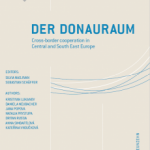1/2019
1/2019 English
You can read or download this PPS here.
10 years of Eastern Partnership and parliamentary elections in the Republic of Moldova – prospects and recommendations for the Danube Region
Sebastian Schäffer/Sergiu Musteață
The Eastern Partnership (EaP) was met with scepticism when it was launched as the Eastern dimension of the European Neighbourhood Policy (ENP) in May 2009, aimed at fostering approximation to the EU of the six countries Armenia, Azerbaijan, Belarus, Georgia, Moldova and Ukraine in the shared neighbourhood with the Russian Federation. Since then, many things have changed, but not necessarily in the direction that Brussels has intended. The lack of anticipation of consequences from the side of the EU member states as well as their contradicting approaches towards Moscow and the ability of the Kremlin to use opportunities arising from this, led, among other things, to the annexation of Crimea. In addition, conflict in the region has increased and EU-Russia relations are at a historic low. However, the blame does not fall on external actors alone; the countries themselves have also contributed to this development. Moldova has transformed from a front-runner of the EaP into a country that is politically and socially stuck: internationally between the EaP and the Eurasian Economic Union (EAEU) and domestically between an oligarch with a pro-European façade and a pro-Russian president. Following the parliamentary election, there doesn’t seem to be an option for forming a new government. Ironically, the “theft of the century” in which one billion dollars from three Moldovan banks disappeared in 2014 under circumstances that remain unclear, happened when a visa-free regime had been concluded with the EU. In Ukraine, five years after the Revolution of Dignity, people in the Eastern part of the country continue to die, and disappointment about missing reforms has led to a television actor getting the most votes in the first round of the presidential elections. The EU, which has been much too occupied with itself and with the seemingly never-ending discussions about Brexit, has neglected its neighbourhood in the last couple of years. If the conditions and priorities from all actors involved do not change, the next decade for the EaP is in danger of losing its ability to bring its target countries closer to the EU.


